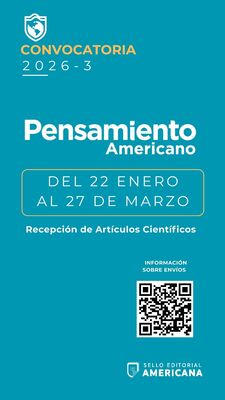Identidade do lugar e cuidado com o ambiente físico da escola
DOI:
https://doi.org/10.21803/penamer.17.35.650Palavras-chave:
Cuidado, Educação, Ambiente físico, Identidade de lugarResumo
Objetivo: Examinar a relação entre a identidade local e o cuidado com o ambiente físico da escola. Embora o cuidado seja entendido como um atributo do relacionamento que requer educação e comprometimento, como um relacionamento entre o cuidador e o cuidado, ele é alcançado quando ambas as pessoas o aceitam, nutrem e se comprometem com ele. Metodologia: foi utilizada uma abordagem de método misto, com o uso de estatísticas descritivas para apresentar as informações; a análise dos dados foi feita com o uso do software estatístico IBM SPSS para realizar testes estatísticos e relações entre variáveis, contrastando com seu aspecto qualitativo de observação por meio de uma lista de verificação, apenas para aumentar a confiabilidade. Resultados: foi demonstrada uma relação positiva entre a identidade do lugar e o cuidado com o ambiente físico da escola;
com relação à identidade do lugar e aos níveis de educação dos alunos, a relação é inversa e negativa, com um valor dependente de -10,71. Conclusões: os resultados podem ser usados para criar diretrizes educacionais que contribuam para estratégias institucionais, a fim de alcançar maior consciência e cuidado com o espaço que utilizam, concluindo que as
escolas devem ser concebidas como ambientes que ressoam profundamente com os alunos, promovendo um senso mais forte de identidade e conexão, para resolver as oportunidades de melhoria encontradas na identidade de lugar à medida que os níveis acadêmicos dos alunos aumentam.
Downloads
Referências
Buendía, E. Leonor, Colas P. y Hernández F. 1998. Métodos de Investigación en Psicopedagogía. Editorial Mc Graw Hill. España.
Breakwell, G (2014). Identity Process Theory. Identity Social Action and Social Change. Cambridge Unviersity Press.
Canter, D (1977) “The Psychology of place”.Ed The Arquitectural Press, London.
Chauxe, 2005. Las relaciones de cuidado en el aula y la institución educativa. . La educación desde las éticas del cuidado y la compasión. Editorial Pontificia Universidad Javeriana. Bogotá - Colombia. Pgs 127 – 143.
Cajiao, Francisco. 2004. La Ética del Cuidado. En www.seduca.gov.co/portal/herramientas/el_cuidado_francisco_cajiao.doc.
Cifuentes, M. Jairo. 2005. “La ética del Cuidado y la Compasión una respuesta a los problemas del mundo actual” - Vicerrectoría Académica – Pontificia Universidad Javeriana. Congreso “La educación desde las éticas del cuidado y la compasión”. Bogotá.
Escobar, A. Patricia. 2005 - El cuidado de las relaciones de familia como eje integral del crecimiento de los niños en la formación moral de la escuela - . La educación desde las éticas del cuidado y la compasión. Editorial Pontificia Universidad Javeriana. Bogotá - Colombia. Págs 81 – 88.
Goleman Daniel. 2006. Inteligencia Social. Editorial Planeta Mexicana S.A. pgs 86 -87.
Holahan, C. 1999. Psicología Ambiental: un enfoque general. Editorial Limusa. México DF.
Knez, 2005. Attachment and identity as related to place and its perceived climate. Journal of Environmental Psychology 25. 207 – 218.
Proshansky, Fabian y Kaminoff (1983). “Place-identity; physical world socialization of the self. Journal of Environmental Psychology. Academic Press Inc. London.
Lalli, M. 1992. Urban Related Identity: theory, measurement and empirical findings. Psicological Institute, technical University of Darmstadt, Germay. Journal of environmental psychology. Ademic press ltd. 285 – 303.
Mesa, J. Alberto 2005. La ética del cuidado y sus implicaciones en la formación moral en la escuela. En el Libro, La Educación desde las Éticas del Cuidado y la Compasión. Editorial Pontifica Universidad Javeriana. Bogotá – Colombia. Pg 25.
Morín E, Ciurana E, & Motta R. 2002. Educar en la Era Planetaria. UNESCO, Editorial Universidad de Valladolid.
Neisser, U. et al. 1996. Intelligence: Knowns and unknowns. American Psychologist. Washington D.C., Feb., vol. 51, n.º 2, págs. 77-101.
Noddings, N. (2002) Educating Moral People, Sage Publication.
Noddings, N (1992). The Challenge to care in the Schools. Second Edition.
Olweus, Dan & Roland, Erling (1983) Mobbing – bakgrunn og tiltak. Oslo: Kirke- og Undervisningsdepartementet.
Trilla, J. (1993) La educación y la ciudad. (1993) En Otras Educaciones. Anthropos. Barcelona. Pp. 177-203.
Páramo, Pablo – 2008. Investigación en ciencias Sociales. Universidad Piloto de Colombia – Bogotá. Pg 172.
Páramo, Pablo 2007. El significado de los lugares públicos para la gente en Bogotá. Universidad Pedagógica Nacional, Bogotá Colombia.
Relph, Edward (1976) Place and Placelessness. London: Pion.
Twigger-Ross, C.L., & Uzzell, D. L. (1996) Attachment and Identity Related to Place a Perceived Climate. Journal of Environmental Psychology, 25, 207-218.
Zimmermann, M 1998. Psicología Ambiental y Calidad de Vida. Bogotá D.F. Edición Marcel Zimmermann.
Downloads
Publicado
Edição
Seção
Licença
Copyright (c) 2024 Pensamiento Americano

Este trabalho está licenciado sob uma licença Creative Commons Attribution-NonCommercial-NoDerivatives 4.0 International License.
The author or authors of an article accepted for publication in the Journal Pensamiento Americano will transfer all of the patrimonial rights to the American University Corporation free of charge, within which are included: the right to edit, publish, reproduce and distribute both print media as digital, in addition to include in article in international indexes and / or databases, likewise, the Editorial Seal is authorized to use the images, tables and / or any graphic material presented in the article for the design of covers or posters from the same magazine. By assuming the patrimonial rights of the article, it may not be partially or totally reproduced in any printed or digital media without its express permission.
AUTHORITY ASPECTS
For the Pensamiento Americano Journal, all the authors of an article have made substantial contributions to the research and the manuscript, and they share the responsibility when the article presents errors, fraud in some way or violations of copyright.
After submitting an article, the journal does not accept the addition, deletion or change in the order of the authors, in addition we reserve the right to release the article when it has been submitted to the journal and under no circumstances will American Thought accept the article. withdrawal of an article during any phase of the editorial process





